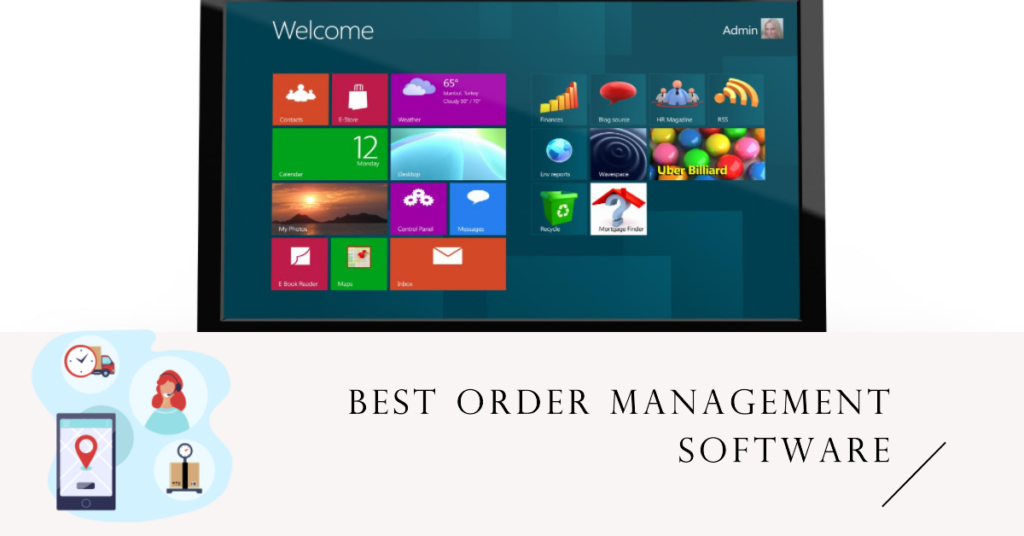Tired of order mishaps and manual processes? Streamline your business operations and boost efficiency with the best order management software on the market. Take control of your orders like never before! The best thing is that you can say goodbye to order management systems (OMS) headaches and hello to the ultimate solution. Discover the best ways to manage orders that will revolutionize your business processes.
What Is Order Management Software?
A simple order management software is an innovative computer-based system that aims to optimize the entire order management lifecycle, spanning from order placement to fulfillment. This cutting-edge solution has found extensive application in diverse industries that has revolutionized the way businesses handle their sales orders.
Now we have the best order management system in the field of ecommerce platforms, retail etc. Ordering management system is also called the Trade order management system. These types of softwares are used in the management of trade between different parties. By implementing these order management solutions errors can be reduced, ultimately improving customer satisfaction.
How Does Order Management Software Work?
Every online brand has its unique set of requirements and goals that an organization has to focus. The nature of the products being sold significantly influences the organization’s order management systems.
Take, for instance, a retailer specializing in high-end computers and technology. His approach to order lifecycle management will be different from that of a fashion brand. Moreover, the prioritization of channels plays a crucial role in determining how customer orders are managed.
A range of functionalities are present in best Order Management Software. From ecommerce platforms to best B2B websites implementation of these functionalities is necessary. Some of the functionalities are as follows:
- The software allows the internal user or customers to place an order on various platforms, including online platforms, mobile apps, or manual entry.
- Once a customer places an order the software initiates the b2b ordering platform.
- Order management software helps businesses keep track of the b2b inventory management software across multiple locations or warehouses
- The software facilitates order fulfillment by assigning orders to appropriate fulfillment centers or warehouses.
- These softwares often includes features for sending automated order confirmations, shipping notifications, and tracking information to customers.
- One of the key features of the best order management system is its ability to handle complex ecommerce order management systems and B2B order management systems.
- The software also manages customer order management and the process of handling customer returns or exchanges.
Use Cases Of OMS Software
If a business is large or sells through multiple channels then the order fulfillment process can be quite difficult. Therefore there is a need for vendors to understand the requirements and the platform they will work on. Some of the use cases of OMS software are as follows:
Ship From Store
A contemporary OMS offers various possibilities, one of which is its application in companies aiming to implement a “ship from store” strategy. This approach enables retailers to effectively minimize out-of-stock items while ensuring swift delivery by utilizing inventory available at nearby stores.
With the aid of an OMS equipped with customizable order fulfillment logic, businesses can efficiently manage order routing and shipping optimization. Moreover, a comprehensive OMS equips store employees with the necessary tools to efficiently handle tasks. This includes tasks like order picking, packaging, shipping etc directly from the store.
BOPIS
Another use case is for BOPIS, which is buy online, pickup in store. This process has become an extremely flexible and popular option for users who seek convenience. The customer order management softwares has the capability to manage the complete fulfillment process. It encompasses real-time visibility of inventory, order routing, inventory management, and instant updates.
This ensures a seamless and efficient experience for customers opting for Buy Online, Pick Up In Store, while also maximizing inventory utilization. So you can say that it is the best way for attracting more customers to brick-and-mortar stores by offering real-time information.
Overselling Prevention
Overselling prevention is a common scenario where businesses aim to tackle checkout and post-purchase frustrations effectively. The lack of accurate inventory visibility across various channels often results in customers placing orders, only to face disappointments later.
This results in the cancellation of customers orders due to unavailability of items. To address this issue, the best Order Management software should be equipped with real-time inventory visibility across both physical and digital channels. By preventing canceled orders and minimizing customer support tickets, it enhances the overall user experience.
Factors To Consider When Choosing An OMS
Following factors should be considered when choosing the best order management software:
Scalability:
Scalability is a critical factor to consider when selecting an Order Management software for your business. It is imperative to choose an OMS that is capable of effectively handling your current order volume.
Your OMS should also be able to seamlessly scale as your business expands. This ensures that the system can readily adapt to accommodate the growing influx of orders. It will also help avoid any potential performance issues that may arise.
Real-time Inventory Visibility:
The ability to access accurate information on inventory is of utmost importance to avoid situations like overselling or stockouts. The best Order Management Software should provide real-time visibility into inventory levels across all channels. This ensures effective inventory management, seamless order fulfillment, and minimizes order cancellations caused by unavailability.
Omnichannel Support:
In the dynamic realm of retail, it has become increasingly indispensable for an Order Management System (OMS) to cater to a multitude of sales channels. These encompass not only traditional brick-and-mortar stores but also online marketplaces and ecommerce websites.
A truly effective OMS must possess the capability to facilitate centralized order management across all these diverse channels. This will help ensure a seamless and harmonized experience for customers across the board.
Automation Capabilities:
It is beneficial to seek an OMS that incorporates automation features to streamline the process of order processing. These features include order routing, allocation, and fulfillment. By automating these tasks, manual errors are reduced, operational efficiency is enhanced, and the speed of order fulfillment is expedited.
Integration Capabilities:
The OMS should effortlessly integrate with your current systems, encompassing inventory management, customer relationship management, and ecommerce platforms. A seamless integration ensures efficient data flow and synchronization across diverse systems, reducing the manual labor and minimizing potential errors.
Flexibility and Customization
Every business possesses its distinct set of requirements, workflows, and processes. It is imperative for an OMS to exhibit flexibility and customization options that can effortlessly adapt to specific business needs. By enabling adaptability users can tune the system according to operational workflows, ensuring a harmonious integration with unique business processes.
Benefits Of Using An OMS
Using a order processing system or order processing system has a lot of advantages which are as follows:
- An OMS streamlines and automates various aspects of the order management process, resulting in increased efficiency.
- With an OMS, orders can be processed seamlessly from multiple channels, such as online stores, marketplaces, or brick-and-mortar locations.
- An OMS can be customized to align with specific business requirements and workflows.
- By integrating with inventory systems, an OMS provides real-time visibility into stock levels, allowing businesses to optimize inventory management.
- An OMS captures and analyzes order data, providing valuable insights into sales trends, customer behavior, and performance metrics.
- By automating order processing and providing accurate order tracking information, an OMS enhances the overall customer experience.
- OMS offers scalability, allowing businesses to handle increasing order volumes without disruption.
Challenges Of Order Management Software
The best B2B order management software, much like any other software solution, encounters specific challenges. Let’s explore some common challenges associated with B2B order management software:
Integration Complexity:
B2B order management software often requires integration with various systems, including ERP (Enterprise Resource Planning) systems, CRM (Customer Relationship Management) software, inventory management systems, and payment gateways. The complexity lies in seamlessly integrating with diverse systems and ensuring smooth data exchange, which can pose a significant challenge.
Scalability:
B2B order management software must have the ability to handle large volumes of orders and transactions, especially for businesses with high order volumes. Scaling the software to accommodate increasing order volumes without compromising performance can be a challenging endeavor.
Customization and Flexibility:
Businesses possess unique workflows and requirements when it comes to order management. B2B order management software should offer sufficient flexibility to accommodate different business processes, order types, pricing models, and customization options. Striking a balance between meeting diverse business needs and maintaining system stability can be a challenge in itself.
Data Accuracy and Syncing:
Ensuring accurate and up-to-date data across multiple systems and platforms is a demanding task. Real-time synchronization of inventory, pricing, customer information, and order statuses between the order management software and other systems is crucial for avoiding errors and discrepancies.
Security and Compliance:
B2B order management software deals with sensitive information, such as customer data, payment details, and business-critical information. Ensuring data security, compliance with industry regulations (e.g., GDPR), and protection against cyber threats presents an ongoing challenge.
User Adoption and Training:
Introducing new order management software to a B2B organization necessitates user adoption and training. Effectively training employees on how to use the software, navigate its features, and integrate it into their daily workflows can be quite challenging. Providing adequate support and training resources is essential to maximize the software’s benefits.
Vendor Support and Updates:
Depending on the software provider, receiving timely support and regular software updates can prove challenging. Choosing a reputable vendor that offers responsive customer support and regularly releases updates to address issues, introduce new features, and improve overall performance is of utmost importance.
Top Order management software
Some of the top b2b sales order management software are as follows:
- Salesforce CPQ
- Oracle Netsuite
- SAP S/4HANA
- Zoho CRM
- Microsoft Dynamics 365 Sales
- Shopify Plus
- TradeGecko
- Cin7
- Epicor Prophet 21
- Handshake
- Orderhive
Conclusion
To summarize, the selection of the best order management software holds immense importance for businesses aiming to optimize their operations. An ideal order management software solution should encompass a comprehensive array of features and functionalities. It should effectively streamline the entire process of order fulfillment, starting from order placement and concluding with delivery.
Moreover, the finest order management software should possess robust inventory management capabilities. This enables businesses to efficiently track and oversee stock levels across multiple channels and locations. It should also provide real-time visibility into inventory status, empowering businesses to avert stockouts and minimize instances of overstocking.




